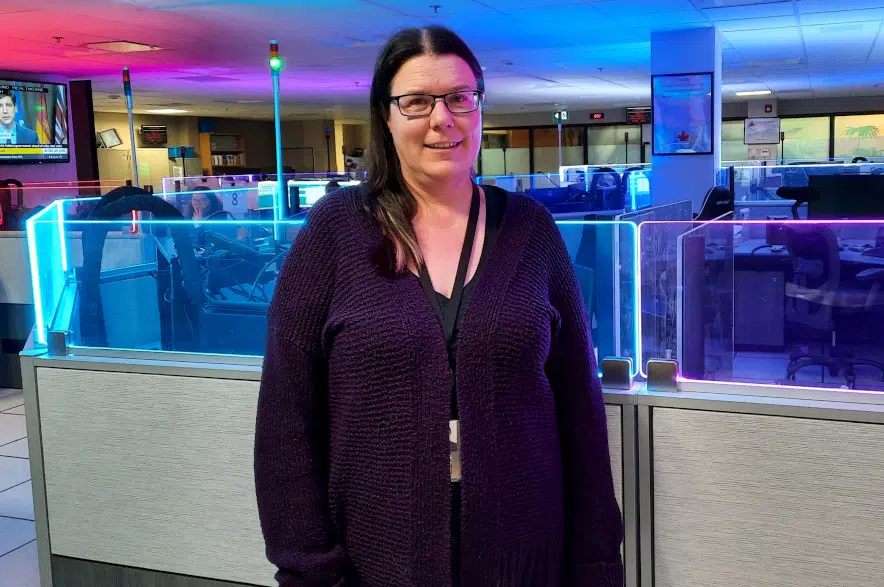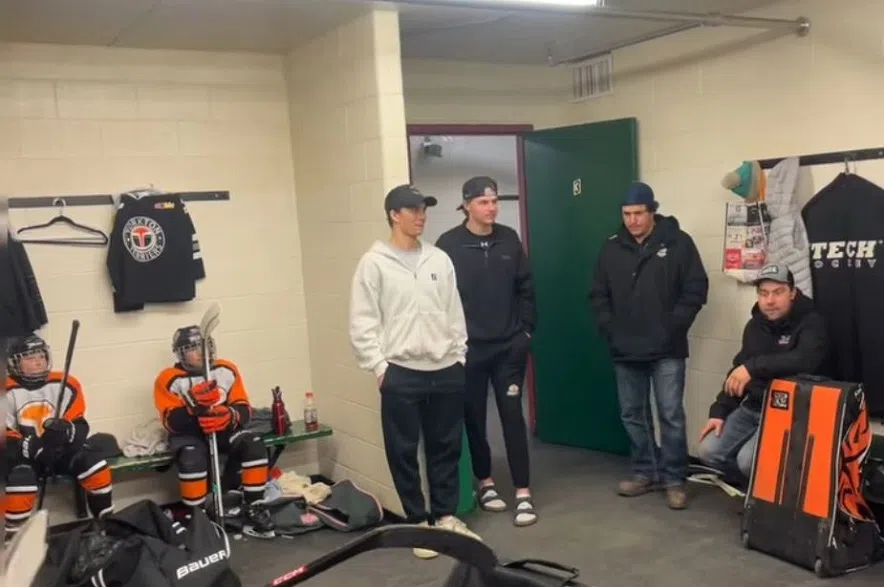In and among the ringing phones, dispatching police and calm but firm voices in the RCMP operational communications centre is a desk now permanently reserved for a nurse.
Crystal Tholl is one of the four nurses involved in the partnership between the RCMP and Saskatchewan Health Authority (SHA).
“Mental health has always been my passion, I love working in psychiatry,” said Tholl.
So when she heard about the position coming up in the RCMP communications centre, she made sure to apply.
Less and less often are police being sent out to simply catch a bank robber or a speeder. More often, police are being sent to scenes or crimes where mental health and addictions play a large component, and the RCMP has just promoted this nursing pilot project to a permanent fixture.

Crystal Tholl is a Registered Nurse with the Saskatchewan Health Authority, working on mental health-related calls with the RCMP’s Operational Communications Centre. (980 CJME)
Tholl and the other nurses are resources in the centre for officers who are at a call where there’s a mental health component, or they can be a person to talk to for people who call 911 in a mental health crisis.
With their training and experience, they can give the officers advice on how to proceed, help a person work through their feelings, and guide an assessment to allow an easier transition into treatment.
“When you call 911 and you’re in a crisis, and you’re having mental health (issues), we wanted to assist the officers (and) have more tools available to them to help the public in real time. That really was the biggest thing, is that we recognize that there was a need for that,” explained Jocelyn James, the manager of the operational communications centre for the RCMP.
The nurses have the relevant training but also have access to the person’s medical information.
“She just talks to them, listens to them, finds out what’s going on and she can provide a recommendation to the officer at that point: ‘Do we need to go to a facility and have a checkup done? Are we able to put a safe plan in place? Can we use some of the community services that are available?’ She can provide referrals to people. There’s so many different ways that they can assist the public,” explained James.
Tholl said working in the communications centre is very different than when she works in in-patient mental health.
“Nursing is very different than a lot of things and now coming into RCMP policing world, it’s very, very different,” said Tholl.
In the nearly one year since Tholl started in the position, she said the biggest shock was how many kids she deals with.
“The overwhelming amount of mental health calls was quite a shock, because you know there’s a lot of mental health. But it’s surprising how much, and the kids,” said Tholl.
She remembers one call in particular — a person who was 11, 12 or 13 years old who’d got into trouble on social media.
“And (that) had led to very, very bad thoughts including thoughts of self-harm and suicide. So (I was) trying to help this young person and say, ‘Yes, I know why you’re feeling this way, and you have every right to feel that way, but now what can we do to turn it around and bring some coping skills into your life?’ ” said Tholl.
It can be a difficult job, according to Tholl, but the people they work with are often grateful.
“Just having someone to listen to you when you’re in a crisis is huge,” she explained.
The RCMP officers are also happy to have the nurses in their ear.
“They are always so grateful for the help because sometimes it’s hard to be able to make those calls when you don’t have that intense training in mental health, so to have that backup, I think it alleviates a little bit of their stress as well,” said Tholl.
The RCMP communications centre only takes calls from the Mounties’ policing areas, meaing outside of the big cities. So Tholl and the nurses can be talking to someone in the most remote parts of the province where treatment is hours away.
“In the past, the officers really didn’t have a lot of options available to them and, quite often, either you were taking them to a hospital to be assessed and that hospital could be six hours away and then you’re sitting there for six to 12 hours and that for an RCMP officer to spend that amount of time,” said James.
This program is filling a big need in the centre; James said calls with a mental health component have gone up 27 per cent in the last five years alone.
“That’s crazy. You can tell that it’s becoming less of a taboo topic and people are wanting help and it’s acceptable to reach out, and so it just shows that we need to be able to provide services. When you call 911, this is an avenue that we can take to help you,” said James.
There are only four nurses in the program right now so it doesn’t run 24 hours a day. James said she hopes to increase it down the road.
“The officers, I have yet to hear anything negative in regards to the program. The No. 1 comment I hear from them is, ‘Why can’t this be 24 hours? We really need this,’ ” said James.







